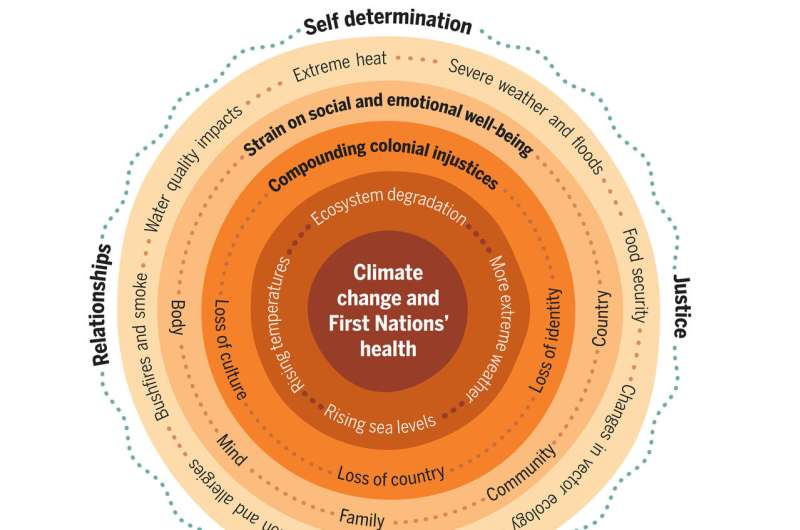This article has been reviewed according to Science X's editorial process and policies. Editors have highlighted the following attributes while ensuring the content's credibility:
fact-checked
peer-reviewed publication
trusted source
proofread
Indigenous voices need to lead Australia's response to the climate crisis

Australia must address historic and contemporary systemic racism to better tackle the climate crisis, according to one of the key conclusions in a paper published in Science, in a special edition where the international publication turns its gaze on examining Australia's environmental challenges.
The paper, co-written by leading Australian Aboriginal and Torres Strait Islander health research organizations, states that Indigenous people hold the knowledge to reform our relationship to the environment. Current Australian laws and policies limit the application of Indigenous knowledge for improved climate change mitigation and adaptation. The paper included researchers from the University of Sydney, University Center for Rural Health (UCRH), the Healthy Environments And Lives (HEAL) network, and the Lowitja Institute.
The review examined existing studies on Indigenous-led climate and health relationships and built on the work of a 2021 national roundtable discussion on climate change and Aboriginal and Torres Strait Islander health, centered on the voices of Indigenous community leaders and advocates.
Associate Professor Veronica Matthews, from the University of Sydney, leading UCRH researcher and Co-Lead Investigator for the CRE-STRIDE Network said the paper highlighted the need to undo historical legacies of colonization for the benefit of a healthier future.
"We already know how important it is to listen to and work with Aboriginal and Torres Strait Islander communities for place-based solutions around health outcomes," said Associate Professor Matthews.
"What health and climate researchers are exploring now is how the same principle applies to climate change.
"The planet's ill health has largely come about because humans have forgotten their relationship and responsibility to Country. Imagine if we could tap into the way First Nations cultures focus on deep, holistic connections to the environment to help us rethink environmental and health policies."
Professor Sotiris Vardoulakis, Director of the HEAL network noted that climate change provides an immediate opportunity to weave together Aboriginal and Torres Strait Islander and Western science to better inform government policy and direction around climate change action.
"We need to embrace diverse knowledge systems and be open to different perspectives. The reality is that tapping into Indigenous ways of holistic thinking will require different approaches to research and policy-making," he said.
A key point made in the paper is the need to address power structures and provide Aboriginal and Torres Strait Islander communities equitable governance over their traditional lands. After this is achieved, communities can revitalize and strengthen cultural practices that protect country and simultaneously build respectful collaborations around climate change and planetary health for the benefit of all.
Lowitja Institute CEO, Adjunct Professor Janine Mohamed said the collaboration reflected the seriousness not only of climate change, but also the significance of the upcoming Australian referendum which, if successful, would enshrine an Aboriginal and Torres Strait Islander Voice in the Australian Constitution.
"A Voice to the Australian Parliament, we believe, will unlock the wisdom held by Aboriginal and Torres Strait Islander people that could help us tackle very real environmental issues," Adjunct Professor Mohamed said.
"Australian Indigenous communities have adapted their ecological knowledge over millennia, yet our work shows this enormous well of knowledge is being overlooked."
The paper concludes that, in the Australian context, an important first step in shifting policy processes to embed genuine and open engagement with Aboriginal and Torres Strait Islander communities will be a successful referendum on the Voice.
"We have a long way to go in redressing past wrongs and embracing the strengths of Aboriginal and Torres Strait Islander culture," Professor Vardoulakis concluded.
More information: Veronica Matthews et al, Justice, culture, and relationships: Australian Indigenous prescription for planetary health, Science (2023). DOI: 10.1126/science.adh9949
Journal information: Science
Provided by University of Sydney





















